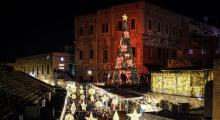Issued by the Catholic Center for Studies and Media - Jordan. Editor-in-chief Fr. Rif'at Bader - موقع أبونا abouna.org

Following is the text of the meditation by Latin Patriarch of Jerusalem His Beatitude Pierbattista Pizzaballa for the 26th Sunday of ordinary time, Year C, September 25, 2022:
The Gospel passage quoted in this Sunday’s Liturgy (Luke 16:19-31) is part of Chapter 16 of the Gospel according to Luke, where, as we said last Sunday, the evangelist reports some statements of Jesus on the fundamental theme for the life of every man, namely, the use of goods.
To get into this passage, we are using the key to the reading that accompanied us during the last two Sundays, that is, the image of home: last Sunday we saw the dishonest steward, who, having been caught out, did everything because, in the moment of need, someone would welcome him in his home (Lk 16:4). And, two Sundays ago, the protagonist was the home of the father, a home that the distant son, who lost everything, yearns for. (Luke 15:17)
There is, also, a home in the background of today’s parable. It is the home of a rich man whose life is full of expensive clothes and delicious food. Interestingly, the parable does not the give the rich man’s name, nor does it even say what he is but only what he has, what he possesses, as if to say that his life is all in his wealth.
Outside this house is Lazarus, a poor man who has nothing, who hopes to receive something that falls from the rich man’s table; but nothing ever emerges from that home for him.
It’s strange: on the one hand, Lazarus is closest to the rich man’s house, since only a door separates them. But he is far away because the rich man does not see him and does not hear him. Lazarus is there, but it’s as if he were not there.
So, we are not surprised that, in the second part of the parable, we find the same scene, the same gulf separates the two. Only this time the roles change, and it is Lazarus, who has finally found a home in the bosom of Abraham, that is dwelling in consolation and the rich man no more.
Then, also assisted by last Sunday’s Gospel, the message is clear. After death, the rich man goes to hell not because he was wealthy during his life, not because he enjoyed his riches, but above all he failed to see the poor man, he did not befriend him (Luke 16:9). He did not use his fortunes to console the needy; he did not open his home so that all could enter there.
Indeed, in his life he traced gulfs, boundary lines, he closed doors.
In the Gospels, the image of the home occurs often. Each instance tells something about the persons who live there.
Whenever you find someone that has experienced salvation, his home is open, the barriers fall, and there is a banquet prepared for everyone. We think, for example of the home of the publican Matthew, in the home of Zacchaeus, and in the home of Jesus’ friends in Bethany.
Where Jesus gift of salvation has not entered, that home remains closed, completely sealed; it is a home where the stranger is judged, frowned upon, unwelcome, excluded. It is the home of those who still have something to defend because they have not found true wealth, the real treasure.
The parable tells us something that awaits us after death. The critical thing to understand is that, in some ways, it will not be a surprise since we will find what we did here. If we built friendship bonds, bridges of friendship, we will find them over there, and it will be our salvation. If we created gulfs, if we kept doors closed, we will discover chasms and closed doors.
A final element: last Sunday, the Gospel spoke of illusory wealth and eternal dwellings, thus touching on an important theme, profoundly linked to that of riches, namely the subject of death.
Riches can be used easily as a deceitful antidote to death. They can give the illusion of being able to overcome death, of being able to remove it. The rich man of the parable fills his life, dining sumptuously every day (Luke 16:19), without thinking of anything, as if there were nothing else except an experience like that.
Riches are not eternal. In eternity, there is only friendship, and only love remains and has the power to defeat death. The rich man allows himself to be deceived by wealth, until death puts truth before him, and he is totally deprived of goods. Not only does he no longer have wealth, but he does not have any friend. Neither does he have his family, for whom he can do nothing anymore.







